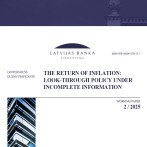The annual inflation down in July: an essential impact of energy and food prices
In July 2015, according to the Central Statistical Bureau data the annual inflation dropped to 0.0%. This drop was determined by the expected decrease in energy prices, contraction of food prices (related to global developments in the dairy products market, as well as the continuation of Russian trade sanctions), and a greater than usual drop in seasonally fluctuating prices.
The drop in oil prices in the global market in July was similar to the one in June, and the price of fuel in retail trade gradually decreased. In addition to the direct impact of oil prices, inflation was influenced by its indirect effects. As expected, the prices of heating energy continued to drop, because for some time average prices of heavy fuel oil had decreased and so had the purchasing prices of natural gas. In July, the natural gas tariffs for households also dropped. It should be noted that the agreement achieved in July between Iran and UN Security Council member states on the curtailing of Iran's nuclear programme points to a possible increase in oil supply in 2016 and thus no upward pressure on prices is generated from the supply side. That in turn means that under the impact of this factor, energy prices in Latvia could remain at the current level or even drop.
Food prices continued to drop globally in July as suggested by the Food and Agricultural Organization data, but it was only determined by two of the largest product groups: dairy and vegetable oils. Cereal prices meanwhile are gradually rising. That could have an impact on the prices of cereal products in Latvia in the current season for, despite the good harvest in Latvia, which would not motivate a rise in prices, Latvian cereal growers or dealers could use the global rise in prices, to export the cereals, for instance. Food prices in Latvia are negatively (i.e. downward) impacted by the extension of Russian sanctions on food export products as well as by the limits imposed on other food products. The annual inflation in July was significantly decreased by the drop in the seasonally fluctuating food prices (mostly vegetables), which exceeded the drop usual for July, as well as the drop in meat products and fresh fish, which could be related to the effect of retaining the Russian sanctions. The prices on beverages also increased at a slower rate, for the cool summer did not foster their consumption.
The increase in the excise tax on tobacco exerted a relatively small upward pressure on the July inflation, whereas the changes in the excise tax on alcoholic beverages, which came into effect in August, will probably not have a significant influence on this year's inflation, for it changes in the opposite direction for different beverages.
The drop in the price levels for such large groups of goods as energy and food, lowered also the so called perceived inflation level. Even though inflation expectations (according to the EC Consumer Survey) did not decrease in July, they are at a relatively low level, and the drop in the aforementioned prices of frequent purchases could be a factor that would stabilize the demand for non-food items and various services. The annual rate of increase for the price levels of these groups remains higher than on average for the consumption basket and accounts for a large part of core inflation. It is maintained also by a gradual rise in income, which is slower than last year yet faster than the inflation and thus increases the purchasing power. However, these considerations notwithstanding, the sales of wearing apparel and footwear were more extensive this July than average for the month of July. The annual core inflation dropped slightly also as the rise in service prices stopped.
Several times, the seasonal effects in some groups of goods and services in 2015 have already been untypical for what was observed in previous years, moreover they were expressed both in the downward and upward directions, thus the July inflation data prevent any hasty conclusions on the average annual inflation. However, if the slowing of core inflation points to caution on the part of consumers despite a rise in income, then the level of annual inflation could be low for a growing economy this year as well.
Textual error
«… …»






